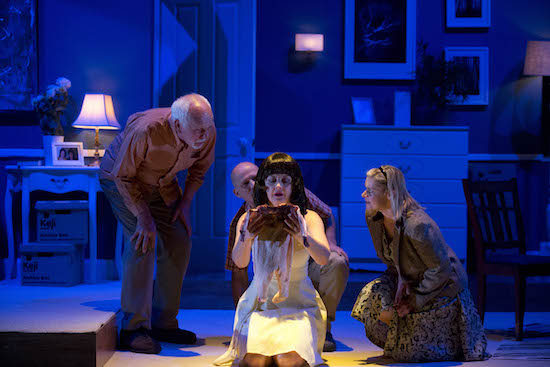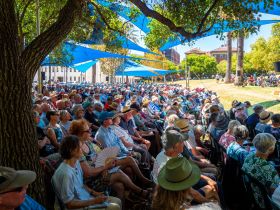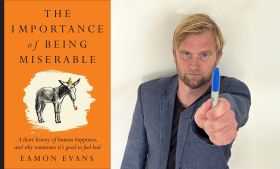Photo by Zakarij Kaczmarek. Image supplied.
When it comes to telling new Australian stories, many playwrights are driven by the need to unearth and exhume. This is as true for Merrigong Theatre Company’s latest commission, Lost Boys (opening in Wollongong in May) as it is for the company’s earlier production, Alana Valentine’s Letters to Lindy (touring nationally from June).
Written by Lachlan Philpott, Lost Boys explores the aftermath of a brutal series of gay hate crimes in Sydney in the 1970s and 80s, in which some 80 men were killed.
Shockingly, the majority of perpetrators in such crimes – of which 30 remain unsolved – were children and teenagers, some as young as 12 years old.
Philpott’s play has particular resonance in Wollongong: one of the murdered men was a local newsreader, Ross Warren, who disappeared in 1989. His body was never found.
But while Lost Boys asks how the perpetrators of such violence live with their guilt even as they raise children of their own, the play very much explores current concerns, while its production was spurred by the recent postal plebiscite.
‘Because of last year’s postal plebiscite a lot of ugly stuff was unleashed in society; a lot of things were allowed to be voiced. For me, that was probably around the point that we made the final decision, yep, we’re going to produce this play,’ said Simon Hinton, Merrigong’s Artistic Director and CEO.
‘Because those things don’t just go away – given the chance they resurface. What we’re seeing in the world today around anti-Semitism for example, that doesn’t just go away because of who won the Second World War. Those attitudes are still there and if you allow them to come back…’
The play’s exploration of toxic masculinity and its strictures is especially relevant in Wollongong, Hinton continued.
‘In a town like ours – a steelworks town and a mining town, but also where the beach culture, the surf culture is so strong, there’s a very strong aspect of territoriality and masculine culture. That is very present here in Wollongong, so we’re not talking about remembering something that happened 30 years ago. We’re talking about very current themes.’
A powerhouse of new Australian theatre
Since 2006, Merrigong Theatre Company – based in the steel city of Wollongong in NSW’s Illawarra region – has commissioned and developed 20 new Australian stage productions.
One such work, Alana Valentine’s Letters to Lindy (based on the National Library’s collection of more than 20,000 letters to Lindy Chamberlain-Creighton) tours to 21 venues nationally later this year.
Learn more about Merrigong’s 2018 season
Despite their disparity of source material, Lost Boys and Letters to Lindy share common themes: how the past influences the present, and what we choose to remember and forget.
‘I think one of the amazing things with Letters to Lindy has been that we know the majority of Australians believed that Lindy Chamberlain-Creighton was guilty [of murdering her daughter Azaria in 1980]. Yet now, when you talk to people, their memories of their own beliefs have shifted. So many people will say, “Oh well, of course I never thought she did it.” So where are all these people who did think she did it? Because that was the majority of Australians back in the 1980s, when it happened,’ said Hinton.

Phillip Hinton, Glenn Hazeldine, Jeanette Cronin and Jane Phegan in Letters to Lindy. Photo by Lisa Tomasetti for Merrigong Theatre Company. Image supplied.
‘There’s an interesting thing too about memory – what does it mean to talk about a nation’s psyche? What’s our memory of these incidents and events that have a national place in our memory, of how we participated in them? Were we part of that mob mentality?’
Some might question the relevance of Letters to Lindy to Wollongong audiences. Hinton laughs at the suggestion.
‘Our phrase that we use is that we’re interested in telling stories of local relevance but universal resonance. Somebody said, “But this isn’t a Wollongong story,” and I said, “Isn’t it? It absolutely is a Wollongong story. It’s about the national psyche; it’s very much something that our audience relates to,’ he said.
‘We’re interested in telling national stories, not just local stories and things that have happened locally but things that are relevant to our audience.’
Merrigong’s success in developing new Australian works is an important reminder that great art can remain relevant to local audiences while still exploring national and even universal stories and themes.
‘From where I sit, the most important thing is that we serve our audience; the rest of it takes care of itself, in a sense. Obviously we aspire to tour and I think everybody likes to have peer recognition and all of those things, but ultimately I feel like I’m doing my best work when we’re focused on making really great theatre for our audience – and it always seems to be that when we really get that right, a show has a further life.’
Lost Boys runs from 23 May – 2 June at Illawarra Performing Arts Centre, Wollongong; the 2018 tour of Letters to Lindy opens at the same venue from 22-23 June before visiting venues across NSW, QLD, VIC and the NT. Visit merrigong.com.au for details.






